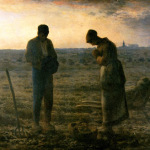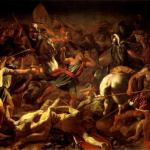 |
| Angelus, Millet |
I committed my life to the lovely Jesus when I was 17, and then and now being ardent, asked, “What should I do?” So momentous a decision had to express itself in action I felt.
And so, being a novice Christian, and not realizing the importance of the seeking the whole counsel of God, I picked up a bit of the jigsaw.
Jesus said, “Whatever you do to the least of my brethren, you do to me.” And so I decided to serve the least of these. I lived near Calcutta, and so at 17 and a half, went off to become a nun and work with Mother Teresa.
It was a temperamental mismatch. I had spent my childhood in an exclusive dreamy boarding school in the Himalayas, run by Irish, English and German IBMV nuns, and where I read, and read, and read. I was reading Thomas Hardy, George Eliot, Matthew Arnold, Galsworthy, Shaw, James Joyce, Joyce Cary…
Suddenly, I joined a community where many people were just learning English, literacy was basic, there was no reading except spiritual reading. I had been so used to living in my mind, in books, in language, and I felt bereft of that. I took an old Bible which had both Latin and English and patiently taught myself some Latin by matching the words!
The hardest part was living in community. This was community in extreme–25 women sharing a single room, which with a constant moving of furniture became a dormitory, refectory, class-room, living room. No privacy, except at times of prayer and meditation–and then, it was your mind and thoughts which were at rest, your body was with 400 others.
Phew. I loved God, loved thinking of Him, talking to Him, learning about Him. Still do. Loved Scripture. Still do. But I just needed a lot more solitude and quiet than I could get in a service-oriented community.
After 14 months there, I realized it was not for me. Mother Teresa had another order, called Sisters of the Word, devoted to a contemplative life. They spent their mornings in prayer and reading Scripture, and their afternoons in proclaiming the Word to the poor, the” spiritually poor,” on the streets, wherever. I fancied it would be just the thing for me.
Mother Teresa had her doors open all day. I asked her if I could either leave and go home or if I could transfer to her contemplative branch from her active branch. She thought I was too young–at 18–for a contemplative life which is generally considered psychologically, spiritually and emotionally more difficult than an active religious life, and asked me to apply to that order when I was 21.
When I was 21, of course, English in Oxford absorbed all my thoughts. My faith was virtually non-existent. And that was that!!












.jpg!Blog.jpg)